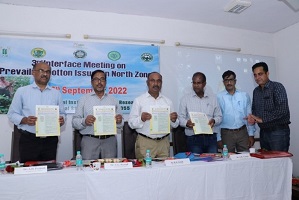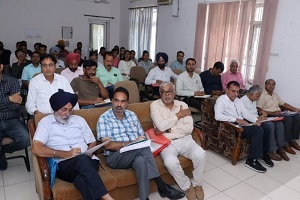16 September 202, Sirsa
ICAR-Central Institute for Cotton Research, Regional Station organized the third “Stakeholders Interface Meeting on prevailing Cotton issues in North Zone here today.
Prof. B.R. Kamboj, Vice-Chancellor, Chaudhary Charan Singh Haryana Agricultural University, Hisar in his opening remarks appreciated the cooperative joint efforts of all stakeholders towards providing timely crop advisories to farmers and reiterated that timely release of canal water can promote timely sowing operations in the irrigated north zone states of Haryana and Punjab.


Dr. R. K. Singh, Assistant Director General (CC), ICAR, emphasized on finding out the reasons behind the lower cotton productivity in the Zone, breeding for whitefly and leaf curl resistance and steps for assurance of seed quality to farmers.
Dr. Y. G. Prasad, Director, ICAR- Central Institute for Cotton Research, Nagpur, emphasized the need for adopting agro-ecosystem analysis approach for holistic management of increasing frequency of biotic and abiotic stresses limiting cotton productivity in the north zone and providing the right advisory by the all stakeholders at the right time to farmers for better crop care.
Dr. A. H. Prakash, PC-AICRP on Cotton & Head, ICAR-CICR RS, Coimbatore highlighted the technologies hybrids/varieties developed for the north zone under AICRP-on cotton.
At the outset, Dr. S. K. Verma, Head (I/c), ICAR-CICR RS, Sirsa and Convener presented an overview of the cotton crop situation in the North Zone.
Dr. A. S. Dhatt, PAU, Ludhiana & Dr. P. S. Shekhawat, SKRAU, Bikaner, Directors of Research; Dr. Rajbir Singh, Director ICAR-ATARI (Zone-I); Joint Directors of State Department of Agriculture, delegates from private seed and input industry, cotton scientists from all three SAUs and progressive farmers participated in the meeting.
On this occasion, a publication on “Advisory for cotton-pest & Disease Management in North Zone” was released by the dignitaries.
A panel discussion session under the Chairmanship of Dr. Y. G. Prasad, Director, ICAR-CICR, was held on the prevailing cotton issues related to seed, soil health, water and nutrition management, pest and disease situation in all the three states.
The panel noted that pink bollworm (PBW) incidence is increasing and there is an immediate need for proper monitoring through pheromone trap catches, destructive sampling of green bolls and taking up of economic threshold (ETL) based insecticide sprays to minimize economic damage in this crucial crop stage. The panel also suggested several off-season and pre-season management steps.
(Source: ICAR-Central Institute for Cotton Research (CICR), Regional Station, Sirsa)








Like on Facebook
Subscribe on Youtube
Follow on X X
Like on instagram